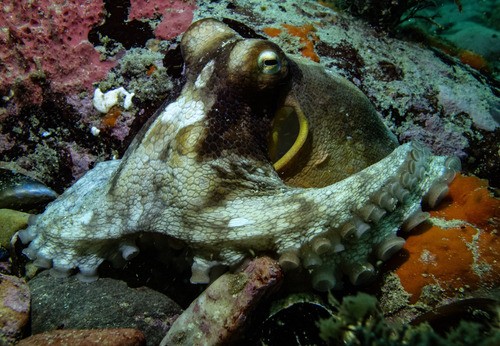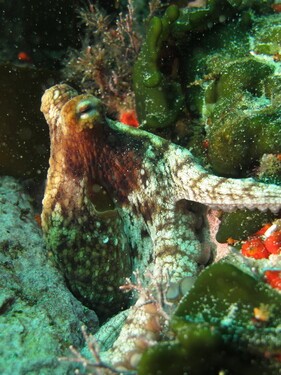Octopus Intelligence

Octopuses are strange and fascinating creatures, so strange that some people truly believe them to be aliens with cosmic origins. But these shape-shifting, color-changing creatures with eight arms and three hearts are just another one of Mother Nature’s works of art. Although mind-boggling, their abstract design is not what interests me most about these creatures; it is their intelligence, unique personalities, and complex behaviours.
When discussing animal intelligence, one tends to associate brain power with other primates, cetaceans, or your household furry friend. You’d assume that a mollusc, a relative of your garden snail, has no business being so smart. But octopuses are rule-breakers who don’t like being told what they can and can’t be. These animals have baffled scientists times, and on the topic of intelligence, they’ve made experts rethink leading theories on its development and evolution.
The Social Intelligence hypothesis suggests that higher intelligence evolved to navigate social group dynamics. This hypothesis holds true for dolphins, chimps, and humans, but for the octopus, the most intelligent and innovative invertebrate, they are the exception.
From the moment an octopus is born, the baby must fend for itself and quickly learn to recognise its food and foe, how to hunt, and avoid being hunted. Lacking a protective shell or any defensive weapons, an octopus is extremely vulnerable to predation. But their secret weapon is their brillant mind. They can outsmart their predators, avoiding detection by blending into their environment, evading pursuit by using tools or an inky ‘smokescreen’, or even escaping their predator's grasp once captured. There are reports of Octopuses blocking the gills of sharks, practically suffocating them until they release them from their grip.
Octopuses have even, on occasion, outsmarted humans. In her book “The Soul of an Octopus”, Sy Montgomery recalls a story from New England Aquarium where researchers reported that their fish were mysteriously disappearing one by one... There were no predators in that exhibit, so the aquarists could not figure out where they were disappearing to. One day the culprit was caught red-handed. An octopus from a nearby tank would break out and walk across the floor for some late-night fish fingers, then return to its tank and close the lid to cover his tracks.
Captive octopuses are known to be escape artists, and many aquariums have enrichment programs, giving the octopus toys or puzzles to keep them mentally stimulated and out of mischief.
In the wild, there is plenty to keep them busy. Octopuses are extremely adaptive predators with a big appetite. Each type of prey requires a different strategy.
When discussing animal intelligence, one tends to associate brain power with other primates, cetaceans, or your household furry friend. You’d assume that a mollusc, a relative of your garden snail, has no business being so smart. But octopuses are rule-breakers who don’t like being told what they can and can’t be. These animals have baffled scientists times, and on the topic of intelligence, they’ve made experts rethink leading theories on its development and evolution.
The Social Intelligence hypothesis suggests that higher intelligence evolved to navigate social group dynamics. This hypothesis holds true for dolphins, chimps, and humans, but for the octopus, the most intelligent and innovative invertebrate, they are the exception.
From the moment an octopus is born, the baby must fend for itself and quickly learn to recognise its food and foe, how to hunt, and avoid being hunted. Lacking a protective shell or any defensive weapons, an octopus is extremely vulnerable to predation. But their secret weapon is their brillant mind. They can outsmart their predators, avoiding detection by blending into their environment, evading pursuit by using tools or an inky ‘smokescreen’, or even escaping their predator's grasp once captured. There are reports of Octopuses blocking the gills of sharks, practically suffocating them until they release them from their grip.
Octopuses have even, on occasion, outsmarted humans. In her book “The Soul of an Octopus”, Sy Montgomery recalls a story from New England Aquarium where researchers reported that their fish were mysteriously disappearing one by one... There were no predators in that exhibit, so the aquarists could not figure out where they were disappearing to. One day the culprit was caught red-handed. An octopus from a nearby tank would break out and walk across the floor for some late-night fish fingers, then return to its tank and close the lid to cover his tracks.
Captive octopuses are known to be escape artists, and many aquariums have enrichment programs, giving the octopus toys or puzzles to keep them mentally stimulated and out of mischief.
In the wild, there is plenty to keep them busy. Octopuses are extremely adaptive predators with a big appetite. Each type of prey requires a different strategy.

One of their favourite meals, a juicy crab, is fast and armed with sharp pincers. The best way to capture a crab is a surprise attack requiring stealth and camouflage or a hypnotic display to mesmerise and confuse the unsuspecting victim. Most fish are too quick to pursue, and so some octopuses have learned to hide and use the tip of one of their arms to mimic a worm, drawing the fish into a trap. Other mollusks like abalone or limpets are easy to catch but are protected by a thick shell and are suction cupped to the substrate. An octopus will drill through the shell and inject venom to weaken the muscle before they can be removed and eaten. Most impressively, the octopus knows the exact spot on each prey where the venom will be most effective, and that requires the least energy to drill.
Octopuses are also master trackers. They know exactly where to find their favourite prey and create mental maps of their habitat, always aware of the quickest route home to safety. All of this knowledge, adapting, and problem-solving is a lot for an octopus to learn and remember in its short one-to-two-year lifespan. This contradicts all the assumptions of the social intelligence hypothesis and requires a new theory – the ecological intelligence hypothesis. This theory explains that octopuses have evolved their impressive intelligence to navigate their complex ecology and survive successfully.
As a diver, it is always exciting to see an octopus and a privilege to witness them in action. Whether it be on a hunt or avoiding the four-limbed, bubble-blowing potential predator by blending into their environment, octopuses are always a highlight on a dive. They are also very curious and look back at you with the same wonder and amazement that you look at them, sometimes even extending an arm to get a feel and taste of you. Octopuses are capable of recognising individual humans.
Captive octopuses are known to squirt water jets at people they don’t like and enjoy holding the hands of their friends. A special case of this was witnessed in the Oscar award-winning documentary “My Octopus Teacher”, where a man formed an intimate bond and friendship with a wild octopus.
It is important to remember that with this higher intelligence comes sentience. Octopuses are capable of experiencing pleasure and pain, stress, and excitement. They also have individual personalities, meaning some will be more curious of you while others will be terrified. Not every diver will experience a ‘My Octopus Teacher’ moment, and it is important not to try to force one. Be respectful of these animals, observe them from a short distance, and do not stick your hands into their den or try to touch them. If they reach out for a high five or to check your camera settings, be gentle, let them lead the interaction, and hope your dive buddy has their camera ready.
Octopuses are also master trackers. They know exactly where to find their favourite prey and create mental maps of their habitat, always aware of the quickest route home to safety. All of this knowledge, adapting, and problem-solving is a lot for an octopus to learn and remember in its short one-to-two-year lifespan. This contradicts all the assumptions of the social intelligence hypothesis and requires a new theory – the ecological intelligence hypothesis. This theory explains that octopuses have evolved their impressive intelligence to navigate their complex ecology and survive successfully.
As a diver, it is always exciting to see an octopus and a privilege to witness them in action. Whether it be on a hunt or avoiding the four-limbed, bubble-blowing potential predator by blending into their environment, octopuses are always a highlight on a dive. They are also very curious and look back at you with the same wonder and amazement that you look at them, sometimes even extending an arm to get a feel and taste of you. Octopuses are capable of recognising individual humans.
Captive octopuses are known to squirt water jets at people they don’t like and enjoy holding the hands of their friends. A special case of this was witnessed in the Oscar award-winning documentary “My Octopus Teacher”, where a man formed an intimate bond and friendship with a wild octopus.
It is important to remember that with this higher intelligence comes sentience. Octopuses are capable of experiencing pleasure and pain, stress, and excitement. They also have individual personalities, meaning some will be more curious of you while others will be terrified. Not every diver will experience a ‘My Octopus Teacher’ moment, and it is important not to try to force one. Be respectful of these animals, observe them from a short distance, and do not stick your hands into their den or try to touch them. If they reach out for a high five or to check your camera settings, be gentle, let them lead the interaction, and hope your dive buddy has their camera ready.
Categories
2025
2024
February
March
April
May
October
My name is Rosanne… DAN was there for me?My name is Pam… DAN was there for me?My name is Nadia… DAN was there for me?My name is Morgan… DAN was there for me?My name is Mark… DAN was there for me?My name is Julika… DAN was there for me?My name is James Lewis… DAN was there for me?My name is Jack… DAN was there for me?My name is Mrs. Du Toit… DAN was there for me?My name is Sean… DAN was there for me?My name is Clayton… DAN was there for me?My name is Claire… DAN was there for me?My name is Lauren… DAN was there for me?My name is Amos… DAN was there for me?My name is Kelly… DAN was there for me?Get to Know DAN Instructor: Mauro JijeGet to know DAN Instructor: Sinda da GraçaGet to know DAN Instructor: JP BarnardGet to know DAN instructor: Gregory DriesselGet to know DAN instructor Trainer: Christo van JaarsveldGet to Know DAN Instructor: Beto Vambiane
November
Get to know DAN Instructor: Dylan BowlesGet to know DAN instructor: Ryan CapazorioGet to know DAN Instructor: Tyrone LubbeGet to know DAN Instructor: Caitlyn MonahanScience Saves SharksSafety AngelsDiving Anilao with Adam SokolskiUnderstanding Dive Equipment RegulationsDiving With A PFOUnderwater NavigationFinding My PassionDiving Deep with DSLRDebunking Freediving MythsImmersion Pulmonary OedemaSwimmer's EarMEMBER PROFILE: RAY DALIOAdventure Auntie: Yvette OosthuizenClean Our OceansWhat to Look for in a Dive Boat
2023
January
March
Terrific Freedive ModeKaboom!....The Big Oxygen Safety IssueScuba Nudi ClothingThe Benefits of Being BaldDive into Freedive InstructionCape Marine Research and Diver DevelopmentThe Inhaca Ocean Alliance.“LIGHTS, Film, Action!”Demo DiversSpecial Forces DiverWhat Dive Computers Don\'t Know | PART 2Toughing It Out Is Dangerous
April
